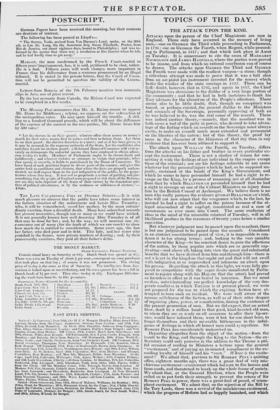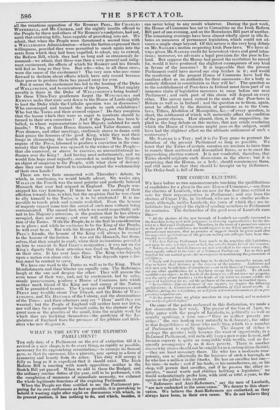TOPICS OF THE DAY.
THE ATTACK UPON THE KING.
ATTACKS upon the person of the Chief Magistrate are rare in England. Three only have occurred in the memory of living men,-one on GEORGE the Third while proceeding to Parliament, in 1795 ; one on GEORGE the Fourth, when Regent, while proceed- ing to Parliament, in 1817; and that which took place at Ascot on Tuesday. It is unnecessary to cite the cases of MARGARET NICHOLSON and JAMES HATFIELD, where the parties were proved to be insane, and from which no rational conclusion can of course be drawn. The attacks upon GEORGE the Third and GEORGE
the Fourth were made with the readiest weapon-a stone; though a ridiculous attempt was made to prove that it was a ball shot
?tom an air-pistol (an instrument invented for the nonce) which broke the window of the state carriage in 1817. There can be littl3 doubt, however, that in 1795, and again in 1817, the Chief
Magistrate was obnoxious to the dislike of a very large portion of the community ; and that he had in both instances to thank his Tory advisers for the alienation of the People's affections. There seems also to he little doubt, that, though no conspiracy was traced, or perhaps existed, the general dislike to the Ministers
and counsels of the Sovereign, personally approving of both as he was believed to do, was the real cause of the assault. There was indeed another theory,-namely, that the assailant was in both cases a tool of the party in power, who desired to take advan- tage of the feeling which an assault on the Sovereign must always excite, to make an assault much more extended and permanent on the liberties of the nation: but of this theory, the proof lay more ill the character of the Ministers of that day than in any evidence that has ever been adduced to support it.
The attack upon WILLIAM the Fourth, on Tuesday, differs from the attacks on his fhther and brother in every particular ex-
cept the instrument. There is not a shadow of reason for con-
necting it with the feelings of any- individual in the empire except those of the criminal; nor are his feelings referable to any cause
whatever but the personal injury which he had, as he supposed un-
justly, sustained at the hands of the King's Government, and which he seems to have persuaded himself he had a right to re- venge on the King, by a process of reasoning not at all dissimilar from that by which BEttiNaFt.km persuaded himself that he had a right to revenge on one of the Cabinet Ministers an injury done him by the British Consul at Archangel. We believe there is no man who coolly peruses the evidence given at BEL LINGH AM'S trial, who will not now.admit that the vengeance which, to the last, he insisted he had a right to inflict on the patron because of the al- leged misconduct of the employe, constituted as real a case • of monomania as ever came into Court. The same confusion of ideas in the mind of the miserable criminal of Tuesday, will in all likelihood produce in the reasoners of twenty years hence a similar conviction.
But whatever judgment may be passed upon the assailant, there is but one judgment to be passed upon the assault. Considered in an abstract constitutional point of' view, it is impossible to con- demn it in too strong terms ; and, looking to the very amiable character of the King-to his constant desire to gain the affections of the nation, by those popular acts which are so generally cap- tivating-and. above all, taking into view the great and substantial benefits that we have derived from him and. through him-there is not a heart in the kingdom that ought not and that will not swell with indignation at so unprovoked and infamous an attack upon his person. Regarding the attack in this light, we were fully pre- pared to sympathize with the eager desire manifested by Parlia- ment to rejoice along with his Majesty that the attack had proved as harmless in effect as it was brutal in intention. But we must confess, notwiihstanding our perfect knowledge of the very des- perate conditioa in which Toryism is at present placed, we were not prepared for the use to which the expiring faction have at- tempted to turn such an incident. We were well aware of' the intense selfishness of the faction, as well as of their utter despair of regaining place, power, or consideration, during the existence of the present generation of men. l3ut we did expect, that an actual blow, dealt by a rutlian band to that good, kind-hearted old man, to whom they are so ready on all occasions to offer their lip-ser- vice, would have induced them, were it but for one short hour, to forget themselves and their miwrable littlenesses in the indul- gence of feelings in which all honest men could sympathize. Sir ROBERT PEEL has considerately undeceived us. Departing altogether from time object of the motion-from the insult to the King, and through the King to the Nation-the ex- Secretary could only perceive in the address to the Throne a piti- ful occasion of reading- to Ministers a lecture upon the general "excitement,- and of paying an insinuated compliment to the ex- ceeding loyalty of himself and his "crew.- Where is the excite- ment? We admit that, previous to Sir ROBERT PEEL'S quitting office, eighteen months ago, there was a great deal of very mis- chievous excitement-excitement which led mento fire houses and farm-yards, and threatened to break up the whole frame of society. We admit that, at the General Election, when the People were called on to put forth their strength to prevent the return of Sir ROBERT PEEL to power, there was a great deal of proud, of trium- phant excitement. We admit that, on the rejection of the Bill by the Tory Lords, there was a revival of the mischievous excitement, which the progress of Reform had so happily banished, and which all the vexa. tious opposition of Sir ROBERT PEEL, Sir CHARLES WETHERELL, and Mr. CROKER, and the nightly insults offered to
the People by these and others of Sir Rossafs coadjutors, had not, until that crowning folly, been capable of provoking into act. We admit, that when the People were threatened a second time with
a WELLINGTON Administration—when the faction expressed their
willingness, provided they were permitted to sneak again into the seats from which they had been expelled, to adopt, nay to extend, the Reform Bill, which they had so long and so strenuously de- nounced—we admit, that there was then a very general and indig- nant excitement, the effects of which Sir Rossar and his friends
will feel as long as they live. But who—who, in all these cases, were the cause of the excitement ? The very men who now come forward to declaim about effects which have only ceased because their power to produce them has passed away for ever.
But it seems the excitement has led to the hooting of the Duke of WELLINGTON, and to caricatures of the Queen. What mighty
novelty is there in the Duke of WELLINGTON'S being hooted? Do these Ultra-Tory gentlemen forget the WINCHILSEA and KENYON mobs that were sent down to House of Lords nightly to hoot the Duke while the Catholic question was in discussion? Who encouraged and trained the people to such exhibitions ? Who but the Tories and their avowed organs ? Do they complain that the lesson which they were so eager to inculcate should be turned to their own correction ? And if the Queen has been li- belled, to whose representations is her Majesty indebted for such insults ? Who, at their HOGG dinners, and Tailor dinners, and Pm dinners, and other meetings, studiously strove to damn with faint praise the honours of the good King, while they rent their lungs in clamouring the health of the Queen? Who, by their organs of the Press, laboured to produce a conviction in the com- munity that the Queen was opposed to the wishes of the People— that she exercised, or strove to exercise, an unconstitutional in- fluence over the King ? And having most unfortunately, and we would fain hope most unjustly, succeeded in making her Majesty an object of suspicion to the People, with what show of decency dare they now stand forward to exclaim against the workmanship of their own hands ?
There are two facts connected with Thursday's debate, to which, in conclusion, we would briefly advert. Six weeks ago, WILLIAM the Fourth was the most popular and perfectly beloved Monarch that over had reigned in England. The People wor- shipped his very footsteps. If there be now any cooling of their affection towards him, to what, but the suspicion that he was about to ally himself to the Tories, is it to be attributed? It is im- possible to touch pitch and remain undefiled. Even the honour of majesty cannot come into the secret of such men without being contaminated. The second filet, which we would respectfully sub- mit to his Majesty's attention, is the position that he has always occupied, does now occupy, and ever will occupy in the estima- tion of the Tories. With the People, he is the first in consideration as in place ; and while he continues to be the King of the People, he will ever be SO. But with Sir ROBERT PEEL, and Sir ROBERT PEEL'S friends, the honour of the King will always be second to the honour of the faction. It was not the Monarch, but them- selves, that they sought to exalt, when their insinuations prevailed on him to consent to Earl GREY'S resignation; it was not on the King's dignity that their attention was fixed on Wednesday, but on their own. It has ever been thus. The King who depends upon a nation can alone rule : the King who depends upon a lite- tion must be content to serve.
We have one word to the Tories as well as to the King. Their blandishments and their bluster are equally vain. The Reformers laugh at the one and despise the other. • They will pursue the even tenor of their way, and, not by excitement, but by calm, steady perseverance, produce a House Gf Commons into which neither mock friend of the King nor real enemy of the Nation will be permitted to enter. The CROKERS and WETHERELLS and PEELS may twaddle about Tom Thumb, and the Duke of WEL- LINGTON, and Mr. DAVIDGE of the Coburg, and the abominations of the Times ; and their admirers may cry- " Hear" until they are wearied; but the People of England will neither hear nor listen, nor will they for a moment be turned aside, by the rhetoric of the great men or the plaudits of the small, from the mighty work for which they are buckling themselves—the purifying of the Le- gislature of England from the presence of the jobbers and trick- sters who now disgrace it.




























 Previous page
Previous page